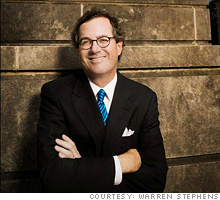Search News
(Fortune) -- As the battle for financial reform continues, countless ideas have by now been floated about how to regulate the financial services companies. But the proposals being discussed don't address the reforms we need -- and risk further hurting credit availability and the economy.
The concept of creating a new bureaucracy to provide "protection" to consumers, for instance -- even under the Federal Reserve -- not only is flawed but also poses a roadblock to the return of better economic times.
 |
| Warren A. Stephens is CEO of Stephens Inc., an independent investment bank based in Little Rock. |
New restrictions and conditions on consumer lending, which this newly empowered bureaucracy would surely impose, would reduce credit available to consumers -- and increase the cost of the credit that is made available.
So while it might protect a few from abuse, it will inhibit access to credit for tens of thousands. Without that access to credit, economic recovery and job growth will be even more anemic. Consumers would suffer, even though the role of consumer credit in the financial crisis appears minor at best -- especially when we have much bigger issues.
The most obvious of those issues is leverage. One of the primary causes of the turmoil that brought the financial system to the brink of collapse was the fact that the investment banks were overleveraged while the balance sheets of commercial banks were undercapitalized.
If an investment bank has a leverage ratio of 30 to 1, a drop in asset prices of 3.3% will basically wipe it out. Surely we've learned that all asset classes are at risk for a disruption in liquidity, the magnitude of which could far exceed 3.3%. The combination of overleverage and undercapitalization magnified the risk to our financial system and will continue to do so unless leverage ratios are capped.
This is not to say we need to return to the Glass-Steagall-era laws that separated commercial banking from investment banking. We don't. But one of the reasons for the legislation adopted in the 1930s was a perception that the banks were forcing companies to sell securities to the public to repay their bank loans.
When the Gramm-Leach-Bliley Act passed in 1999, repealing parts of Glass-Steagall, the practice of "tying" investment banking services with commercial bank lending was still forbidden. But this part of the law has never really been enforced, and there are numerous instances of banks doing exactly that.
Indeed, in many cases there is not an underwriter of a public offering that doesn't have a lending relationship with the company. Companies that are the "victims" of this practice don't speak up because of fear of retribution from their lenders. That is not in the best interests of shareholders, nor is it the best policy result for capital formation. If we continue to allow commercial and investment banks to reside under the same ownership, this "tying" prohibition must be enforced.
Instead of placing restrictions on consumer credit, our government officials should be setting limits on leverage and capital ratios and enforcing the laws already on the books. Specifically, they should impose a 15-to-1 leverage ratio on all investment banks (using the common definition, assets divided by shareholder equity, Goldman Sachs (GS, Fortune 500) is currently at 12 to 1, Morgan Stanley (MS, Fortune 500) is at 16.5 to 1).
They should also require higher capital ratios at commercial banks and at the holding-company level. Why not create a sliding scale on capital requirements? The bigger your balance sheet, the higher percentage of capital you should have to maintain. That would allow small banks that are no systemic threat to have lower capital ratios while the very large institutions that are "too big to fail" would have a greater equity capital cushion if a crisis did occur.
Finally, we need to allow commercial banks to make unallocated additions to their loan loss reserves. We eliminated this practice in the name of stopping banks from "managing" their earnings, but setting reserves aside when times are good -- knowing that some loans will get into trouble when the economy turns down -- is a prudent thing to do.
If we can enact reforms on these lines, we will go a long way to preventing a future crisis and restoring faith in the strength of our financial system -- without impeding our economic recovery. ![]()






| Company | Price | Change | % Change |
|---|---|---|---|
| Ford Motor Co | 8.29 | 0.05 | 0.61% |
| Advanced Micro Devic... | 54.59 | 0.70 | 1.30% |
| Cisco Systems Inc | 47.49 | -2.44 | -4.89% |
| General Electric Co | 13.00 | -0.16 | -1.22% |
| Kraft Heinz Co | 27.84 | -2.20 | -7.32% |
| Index | Last | Change | % Change |
|---|---|---|---|
| Dow | 32,627.97 | -234.33 | -0.71% |
| Nasdaq | 13,215.24 | 99.07 | 0.76% |
| S&P 500 | 3,913.10 | -2.36 | -0.06% |
| Treasuries | 1.73 | 0.00 | 0.12% |
|
Bankrupt toy retailer tells bankruptcy court it is looking at possibly reviving the Toys 'R' Us and Babies 'R' Us brands. More |
Land O'Lakes CEO Beth Ford charts her career path, from her first job to becoming the first openly gay CEO at a Fortune 500 company in an interview with CNN's Boss Files. More |
Honda and General Motors are creating a new generation of fully autonomous vehicles. More |
In 1998, Ntsiki Biyela won a scholarship to study wine making. Now she's about to launch her own brand. More |
Whether you hedge inflation or look for a return that outpaces inflation, here's how to prepare. More |